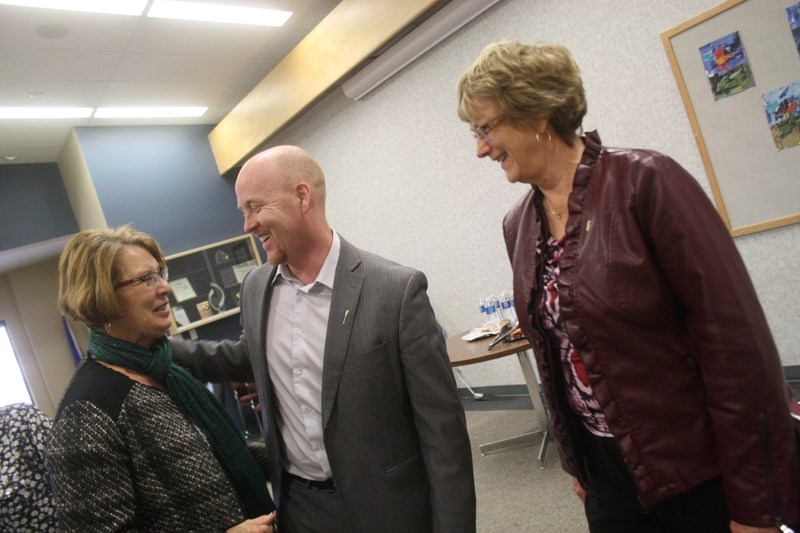In the midst of a labour dispute Education Minister Jeff Johnson dropped by Innisfail Feb. 25 for a morning meeting with school board and county officials. As the government gets ready to come out with budget numbers March 7 Colleen Butler, chair of the Chinook's Edge School Division, says she's convinced he will try to lessen the blow of what can only be a tight environment.
“I think we were able to get across some of our issues,” she said. “We were very pleased to have him come and talk to us. We find him very personable and he listens.”
Discussions wound their way through the topics of labour negotiations, transportation issues, renovation needs at École John Wilson Elementary School, funding family school wellness workers and Education Act regulations.
“I think the big concern is that the budget from the provincial government is going to be very, very tight, so of course that impacts school boards and necessarily schools in the end,” Butler said. “I feel that this minister understands the issues that we're facing and will do all that he can to alleviate as much of the problem as he can.”
Many teachers across the province feel the minister has been getting a bit too personal and on Feb. 28 the office of the privacy commissioner launched an investigation into whether Alberta Education had complied with the Freedom of Information and Protection of Privacy Act when Johnson sent a mass email to more than 30,000 teachers last month.
In an interview with the Innisfail Province Johnson said school boards must seek outside partnerships to help stretch funding from the province.
“We need school boards to be creative and aggressive in looking for those partnerships and engaging the community,” he said. “Certainly Chinook's Edge has been one of the forerunners of that thinking in the province.”
To deliver necessary programming other agencies, boards and commissions should be brought in to help, he said, commending the new campus approach to education in Innisfail and the partnership in Olds with the college and the municipality.
“We're not just talking about managing buildings anymore. We're talking about trying to create truly fantastic educational experiences,” he said. “These are all the same taxpayers so we want to leverage every dollar that we put into the programs for infrastructure so that the entire community and everyone can benefit. I'm excited about the projects that Chinook's Edge is doing and it was great to get a chance to talk to them today about the challenges that they have.”
Last week the minister warned the government would break a promise to increase base grants to school boards by one per cent followed with two more years of two per cent increases, as the Alberta Teachers' Association (ATA) turned down his latest contract proposal. In total 35,000 teachers across the province have been without a deal for the last six months.
In a Feb. 20 letter sent to ATA President Carol Henderson and Jacquie Hansen, chair of the Alberta School Board Association (ASBA) Johnson said a provincewide contract would help rural school boards deal with workloads for teachers.
“School boards, particularly those representing rural schools, have also been clear that there is no one size fits all way to solve this challenge,” it reads. “We can't risk the viability of small rural schools to reach a labor agreement. That is simply not in the best interest of our kids.”
Butler says as it stands Chinook's Edge will lose $1.2 million for inclusive education under a new funding regime, and was glad to have a chance to discuss the issue with the minister.
“They have rejigged the way that the formula works for granting money for inclusive education – which was our special education,” she said. “We can't afford to lose that because the demands are huge and increasing all the time. There are more and more demands on teachers. So this is a real hit to us.”
The government is also in the process of rolling out a long awaited update to the Education Act, and Butler says the school board wants in on helping craft the specific regulations to be put in place.
“Apparently that's where a lot of things are spelled out in detail and we would like to be involved in those decisions,” she said.
Johnson said the new act will be more articulate on how to deal with bullying and empowering school boards while setting up the role of parents and students and expectations of boards and trustees.
“I think it takes a lot of great steps,” he said. “The next thing we have to do is build the regulations around it before we actually put it in force and implement it. So that's what's happening here right away.”




